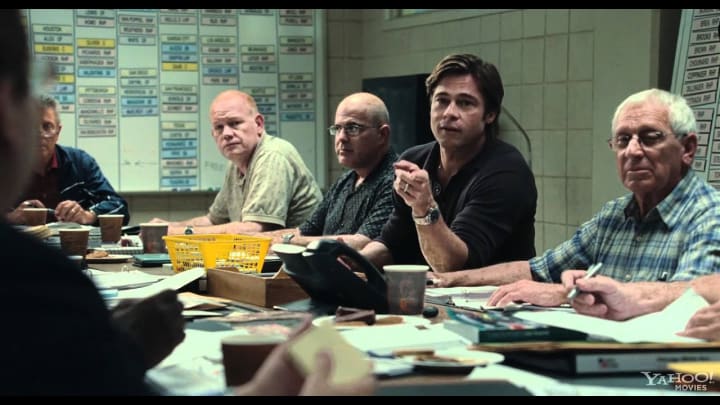Classic Movie Review: 'Moneyball' Starring Brad Pitt
September 2021 is the 10 year anniversary of the release of Moneyball starring Brad Pitt and Jonah Hill.

Moneyball is a baseball movie but you need not be a baseball fan to enjoy it. The intricacy of Brad Pitt's performance, the way his mind works, his various quirks and ticks are so intriguing that he could be talking about stocks, CIA assassinations, or romancing a romantic comedy leading lady and you would be equally engaged. Pitt’s version of real life baseball executive Billy Beane is a full bodied performance, Pitt vibrates restlessly as if his ideas were generated by a constantly whirring unseen engine.
In Moneyball Brad Pitt stars as Billy Beane, the General Manager of the Oakland A's. In 2001 the A's had been successful playing and managing baseball the way everybody else did. Unfortunately, by that time, the economy had begun to weigh on the team, and on Billy in particular. As the story of Moneyball begins, two of the team's marquee players, Jason Giambi and Johnny Damon, are leaving for big contracts from richer teams that the A's can't hope to match.

Billy is tasked to find a way to win with the meager amount of money he has to work with. To do that, Billy will have to find a whole new way to look at baseball. Step one, Billy buys the contract of Peter Brand away from the Cleveland Indians. Who is Peter Brand? He’s not an up and coming prospect. Rather, Peter Brand is a Harvard grad with a degree in Economics. Peter is also a student of Bill James, an amateur statistician who created a controversial metric for measuring the value of players.
Baseball insiders, old school scouts, and the like, despise Bill James and if Billy weren't so far in the hole he might tend to agree. Under the circumstances however, Billy opens up to Peter's unconventional ideas for evaluating players and together they begin the process of changing the way the A's do business. Through a process the media came to call Moneyball, Billy and Peter began to pick up players for very specific purposes, unique skill sets that other teams did not place much value in.

The meat of Moneyball, as a movie, is watching Brad Pitt's Billy weather the storm of controversy and criticism that accompanies his embracing a new way of assembling a baseball team. In this, there are pleasures for both baseball fans and non-fans. For fans, the authenticity of Moneyball in the use of real player names, real trade scenarios and game footage is a treat for the baseball dense memory. For non-fans, director Bennett Miller and screenwriters Steven Zaillian and Aaron Sorkin have crafted something very reminiscent of The Social Network, a study of a fascinating character in a unique setting filled with terrific dialogue and rendered in a way that makes minutia and jargon fashionable and easy to follow.
You don't need a crash course in Sabermetrics to get that Billy Beane operates in a high pressure environment or that his temper occasionally gets the best of him. Brad Pitt makes Beane so compelling that no matter what he's doing you can't take your eyes off of him. It's a quality Pitt has always had but it's especially compelling here for reasons that really need to be seen to understand. Some write of Pitt's performance in Moneyball as a series of tics or bits of actorly business, but I found Pitt's mannerisms, body language, and tics to be a natural extension of a a man with more energy than he knows what to do with. He expects everyone to adapt to him, the world should bend to his will and when it doesn't he gets anxious without ever losing his confident expectation of the outcome he desires. All of that comes from Pitt's lively performance.

Jonah Hill plays Peter, a composite of several real life computer guys who have, since Billy Beane opened the door to them, invaded front offices all across baseball. Hill portrays Peter as a modest guy who happens to have a unique idea and the ear of someone in power. This is Jonah Hill at his least manic and the role suits him. When Moneyball was released it was fashionable to brand Hill a comic supporting player, Moneyball was a statement that Hill would not be easy to typecast and he’s since gone on to an amazingly eclectic and unpredictable career.
You can sense several moments in Moneyball where Jonah Hill would normally riff, as he did in Superbad, but he appears to stop himself because it doesn't fit in with this role. It's a pleasure to watch Hill squirm into this role until he finds a comfortable space; he uses what may be real discomfort opposite Pitt to create Peter and Billy's boss-underling dynamic and hesitant friendship. Hill was reportedly intimidated by Pitt early on and whether that’s true or not, you can sense the sparks of tension between Pitt’s arrogant and decisive character and Hill’s more subservient, people pleasing persona.

Given the thankless role of A's manager Art Howe, the ostensible villain, if you consider Moneyball as a traditional narrative, Phillip Seymour Hoffman picks his spots to shine. Strangely, I was reminded of Hoffman's role in The Big Lebowski where his character used minor vocal inflections or physical cues as much as his dialogue to create an indelible character. Hoffman's Howe is an obstinate ass but you can see a reasonable, if completely frustrated, man behind his grumpiness. There is a genuine concern that underlines Howe's motivations in his war with Billy Beane and that concern is not made plain in dialogue as much as in Hoffman's glowering presence.
There is one truly inside baseball moment that only students of baseball history will get. The film's baseball climax features an historic baseball showdown between the poster player for Sabermetrics, Scott Hattieberg (Chris Pratt), and pitcher Jason Grimsley who, alongside Jose Canseco, stood at the epicenter of baseball's steroid era. It’s a subtle moment but it captures in one instance, one scene, the sea change of American baseball that occurred around 2001 when hitting homers became secondary to on base percentage and many baseball scouts were replaced with number crunchers.

Moneyball has both a baseball climax and a character climax and both are exhilarating in unique ways. Director Bennett Miller's framing of the baseball and character moments of Moneyball allows the film to grow beyond being 'just a sports movie' and into a brilliant movie that happens to be set within the sports world. Brad Pitt gave the performance of his career in Moneyball and it was rightly nominated for an Academy Award.
Moneyball today remains vibrant, specific and energetic. It’s a movie where the character dynamics feel authentic and director Bennett Miller’s approach is well observed, allowing for the tension to rise from the characters and their unique personalities rather than any kind of forced conflict. The book, Moneyball, was believed to be incapable of being adapted for a feature film but Miller saw the potential in Billy Beane and his poignant economic plight amid the moneyed elite of American Major League Baseball and capitalized on it to create a brilliantly unique sports drama that stands the test of time.
About the Creator
Sean Patrick
Hello, my name is Sean Patrick He/Him, and I am a film critic and podcast host for the I Hate Critics Movie Review Podcast I am a voting member of the Critics Choice Association, the group behind the annual Critics Choice Awards.






Comments
There are no comments for this story
Be the first to respond and start the conversation.